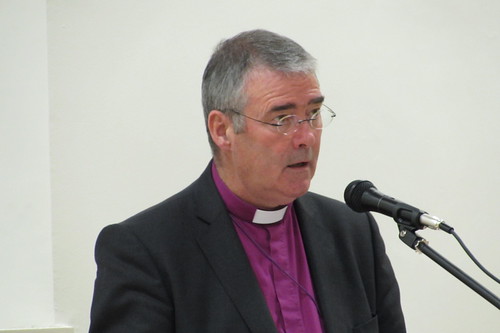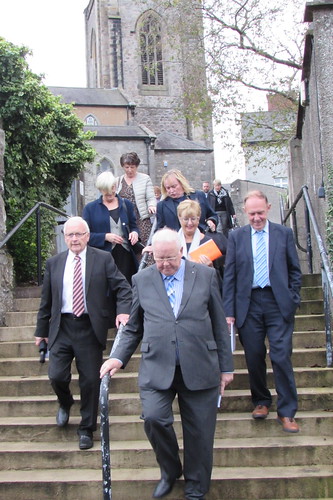Diocesan News
Bishop John McDowell speaks at Clogher Diocesan Synod
The Bishop of Clogher, Right Revd John McDowell, has spoken of the ‘intolerable burden’ that regulations place on voluntary organisations in his Presidential Address to Clogher Diocesan Synod on 26th September.
Speaking at the Synod held in the Cathedral Hall, Enniskillen, Bishop McDowell also referred to the 150th anniversary of Disestablishment and the continuing uncertainty over Brexit. He has already sent an open letter to the Prime Minister.
The Bishop told the Synod: “Last year at this Synod I had some cautious and cautionary words to say about Brexit. But whatever uncertainty existed then has now been deepened by all sorts of developments since and, whatever happens, has brought the whole of the UK to a ‘constitutional moment.’

“Insofar as I have had anything to say about these matters I hope I have done so from a Kingdom perspective where the love of one’s neighbour is the guiding standard. I hope you will remember in your private and public devotions the complex and far reaching events which will unfold in the weeks to come. Pray that what beginnings of peace and integration which we have in this part of the world are sufficient to help us understand one another in a world where barriers are going up rather than coming down.”
Speaking about Safeguarding and GDPR, Bishop McDowell referred to the series of training events which have been held throughout the Diocese.
He said: “I think now is a good time to say something about what might become the intolerable burden which regulatory regimes are demanding of voluntary organisations. The Church is a significant provider of services especially to young people but also to adults of all ages.
“Although there are times when we could have been done better and other occasions when the Church actually inflicted grave harm, for the most part those services have enriched the lives of individuals and communities for hundreds of years. And they are organised and delivered on an almost entirely voluntary basis. And that culture of voluntarism is frankly being undermined by an obsession with regulation that isn’t particularly nuanced or, at times, even proportionate.
“As a church we are probably in greater danger of atrophying and withering through the excessive demands on our volunteers on select vestries, diocesan boards and council, youth organisations and other fellowship groups, than we are from doctrinal or other spiritual matters. And I know this is the experience of many other Christian traditions and indeed non–religious groups. And it needs to be taken into account,” said Bishop McDowell.
The Bishop also referred to the needs of parishes and recommended that parishes should work collaboratively.
He explained: “It has also become very clear to me as I go around the Diocese and speak to those involved very close to the ground that the traditional model of self–sufficient and stand–alone parishes or groups of parishes probably cannot be sustained for very much longer.
“The breadth of skills necessary to maintain and run a parish no longer exists in a single person no matter how gifted they are and it is clear that much greater collaboration will be needed between parishes and within groups of parishes than has been the case up to now. For instance a group of three parishes needs a total of 18 ‘officers’ if you take into account churchwardens, glebewardens, treasurers and secretaries. A union of three parishes would require just 10 (if there are still church buildings in each of the parishes).
“It is also worth thinking about just how much closer a spirit of cooperation is to the spirit of the Gospel than a spirit of competition or of utter independence. Even where a full union of parishes isn’t or can’t be achieved there is no reason why informal collaboration shouldn’t be explored,” he said, adding that parishes should explore external funding opportunities.

Bishop McDowell also commented on the 150th anniversary of Distablishment and said that the Irish Church Act passed in July and which came into effect on 31 December 1869 completed the nineteenth century parliamentary reform of the Church of Ireland. Now, in 1869, the Church of Ireland, united to the Church of England since the Act of Union in 1801 was to be separated, disendowed and disestablished. Fiercely opposed at the time, the Church’s Disestablishment was its liberation.
“Whatever might otherwise have happened, Disestablishment enables the Church of Ireland, like the other churches to continue as one church in two civil jurisdictions. This has allowed it (perhaps required it) to speak to either civil jurisdiction conscious of its place in the other and to speak to both from a grounding in the Kingdom of God.
“Disestablishment therefore set the Church of Ireland free to be what it is, a minority tradition in the Body of Christ, a church on the same standing as others in the family of God, one branch of the True Vine. Ours is a church, that, tracing its history through the often–complex history of these islands cherishes its identity as Catholic and Reformed. It is part of a world–wide communion of churches and of developing ecumenical institutions.
“Without being backward looking or inward looking we have much to thank the Disestablishment generation for, particularly in the financial and administrative arrangements which they devised in very short order and which have survived more or less intact right down to today.
“But there are one or two matters about Establishment and Disestablishment of the Church which we would do well to acknowledge and learn from today.
“First, that Establishment and all the Acts of Parliament that supported it over the years were not only intended to give the Church of Ireland a privileged position far beyond its numbers. At best only 12% of the population of Ireland ever belonged even in the most nominal sense to the Church of Ireland.
“And secondly to note that the ‘Establishment mentality’ of the Church of Ireland didn’t cease with the passing of the Irish Church Act. Certainly over time we learnt not to depend on Big House generosity for our well–being. Certainly we learned to stand on our own two feet financially and indeed spiritually (the Church of Ireland has always been the most clearly ‘Protestant’ of the Anglican churches of these islands). As a result of this rather strong self–preservation instinct both North and South it’s not that we’ve done much harm except from time to time. But we have prevented ourselves from doing much good in society. It has prevented us from being that leaven which we are called to be. And on this island to use our unique position to facilitate the sort of critical dialogue between and within the different jurisdictions on this island,” the Bishop added.
For further information please contact:
Diocesan Communications Officer, Clogher
07708 869823

Mr Brian Donaldson
clogherdco@btinternet.com
